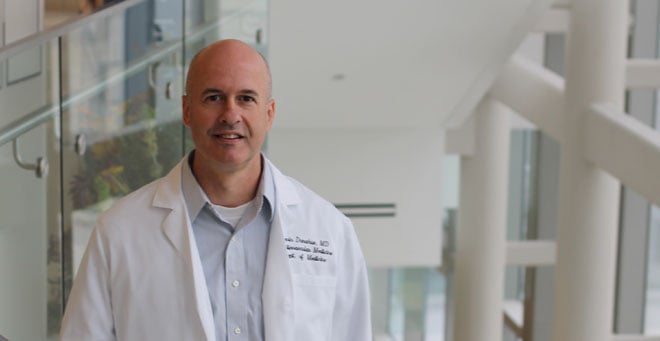 |
|
|
Kevin Donahue, MD |
UMass Medical School physician-scientist Kevin Donahue, MD, is running two federally funded studies of gene therapy for atrial fibrillation.
“As a clinician, I have always wanted to work on something that is a big burden on patients,” said Dr. Donahue, professor of medicine and director of electrophysiology research. “With atrial fibrillation affecting 10 to 20 percent of individuals in their 70s and 80s, the work could have value to a broad swath of patients.”
At least 2.7 million Americans are living with atrial fibrillation, making it the most common type of irregular heartbeat. Caused by a disorder in the heart's electrical system, atrial fibrillation can lead to blood clots, stroke, heart failure and other heart-related complications.
With a four-year, $2.9 million grant from the National Heart, Lung and Blood Institute, Donahue is testing extended therapy with an adeno-associated virus vector already shown to have short term effects on atrial fibrillation in order to keep its therapeutic effects going long-term. His lab will further look at a combination of different genes that preliminary data show works better than one alone.
“The goal of the grant is not just to prevent the fibrillation, which we can do now in the experimental lab, but to try to reverse some of the structural defects that result from the heart failure, high blood pressure, heart attacks—the things that leave people predisposed to atrial fibrillation,” said Donahue. “We might as well shoot for the moon and try to make the atria normal again.”
Complementing the NIH grant, Donahue’s two-year, $2 million award from the United States Department of Defense will test a similar therapy using an adenovirus for gene transfer in post-operative atrial fibrillation, a specific form of atrial fibrillation that peaks three days and dissipates ten days following cardiac surgery.
“Other than being temporary, post-operative atrial fibrillation is similar to common atrial fibrillation, affecting patients with the same risk factors, acting by the same arrhythmia mechanism and causing the same problems,” he explained. “Extensive data from an animal model of atrial fibrillation has shown safety and efficacy of gene transfer that is delivered to the atria using adenoviruses and a novel gene painting technique.
Donahue developed the innovative gene painting technique as a way to deliver the gene transfer agents vector directly to the atria, which are big and complex with no direct arteries leading to them. “We paint the atria using a gelatinous substance that sticks to them with the virus attached to it,” he said. “We use paint brushes because they allow accurate and controlled application of the gene transfer agents directly to the heart muscle.”
Looking ahead, results of the NIH grant should be in around the same time as the DOD clinical trial, yielding both timely safety and efficacy data. Donahue hopes to advance to Phase I clinical trials in humans in about two years.
Related stories on UMassMedNow:
Five-year, $11 million grant to fund new approaches to gene therapy
Newsweek: UMass Medical School develops gene therapy for rare neurodegenerative disease
UMMS gene therapy experts to present new discoveries at inKNOWvation panel discussion
Horae Oriental endows Gene Therapy Center at UMass Medical School with $2M gift
Voyager Therapeutics targets novel gene therapies to combat diseases